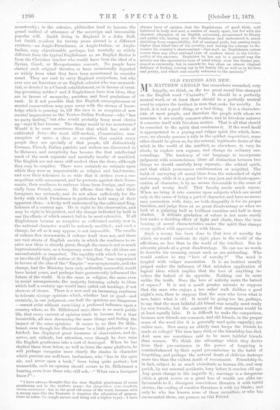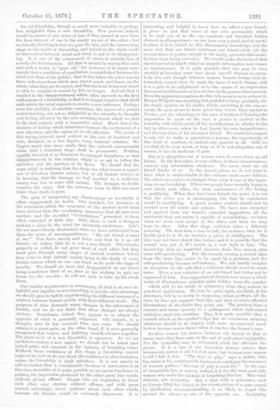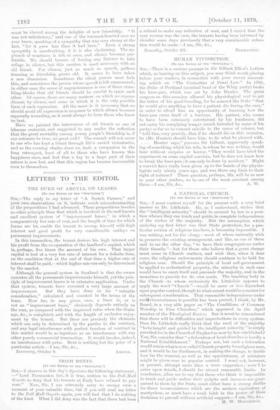OLD FRIENDS AND NEW.
R. MATTHEW ARNOLD has somewhere remarked, very happily, we think, on the too great moral bias stamped
ou the English word " Curiosity." It should be a perfectly neutral word, or at least there should be a perfectly neutral word to express the instinct in man that seeks for novelty. In itself, it is not a good thing, or a bad thing. It is a character- istic of most people, and therefore the people with whom we associate it are mostly common-place, and in frivolous natures it concerns itself with friVolous matter. That is all that should be conceded to the spirit that condemns it. If the word itself is appropriated to a prying and vulgar spirit (for which, how- ever, we already possess a title in the epithet inquisitive), some other should be given us, for the natural, legitimate desire of the mind, in the world of the intellect, as elsewhere, to vary its abode, to explore new regions, and change its ordinary sur- roundings. The tendency of our language to incorporate judgment with nomenclature blurs all distinction between two things we should carefully keep separate,—the critical spirit, and that which pronounces condemnation or acquittal. The habit of surveying all moral ideas from the watershed of right and wrong, while it is a great foe to any just and delicate appre- ciation of character, is by no means favourable to the sense of right and wrong itself. That faculty needs much repose. When we bring it into exercise upon subjects which are moral
'only in the sense of being a part of character, and have no neces-
sary connection with duty, we both disqualify it for its proper function, and judge them at as great disadvantage as when we look at a painting half in brilliant sunshine and half in deep shadow. A delicate gradation of •colour is not more surely lost under a dazzling effect of light and shade, than the true bearing of moral characteristics under the spirit that stamps every epithet with approval or with blame.
Such a wrong has been done to that love of novelty for
which we would vindicate its right place in the world of the affections, no less than in the world of the intellect. But its advocate pleads at a great disadvantage. He can use no words to describe his meaning except such as are misleading. Who would confess to any " love of novelty P" The word is tangled with vulgar association. It is an instinct usually judged under the influence of that mistaken application of logical ideas which implies that the love of anything in- volves the hatred of its opposite. Nothing can be more unlike the truth. Does the love of activity mean the hatred of repose P It is not a much greater mistake to suppose that the man who enjoys a ten miles' walk dislikes a good night's rest, than to suppose that the man who loves what is new, hates what is old. It would be going too far, perhaps, to say that the most faithful old friend was usually most ready for new friends ; but the contrary of that statement would be at least equally false. It is difficult to make the comparison, because new friends are common, and old friends, in the proper sum of the word (for it is generally used quite vaguely), are rather rare. How many an elderly man keeps the friends he made at college P The men have died, or the friendship has died. And men are sometimes said to be more faithful friends than women. We think the advantage which they derive from their pre-eminence in the power of forgiving is counterbalanced by their equal pre-eminence in the habit of forgetting, and perhaps the natural death of oblivion destroys more ties than the violent death of resentment. Friendship is, in fact, subject to as much vicissitude as human. life, and may perish, by not unusual accidents, long before it reaches old age. Any great change in life imperils it ; marriage is a dangerous crisis, a great access or a great loss of wealth are alike un- favourable to it ; divergent 'convictions threaten it with torrid storms, the cooling of emotion threatens it with icy blasts ; and only he who has known none of these casualties, or who has surmounted them, can possess an Old Friend. • Au old friendship, though so much more valuable, is perhaps less delightful than a new friendship. Few persons, indeed, would be aware of any sense of loss, if they passed at once from the keen interest of one to the steady repose of the other ; but we lose the first long before we gain the last, and the intervening stage in the world of friendship, and indeed in the whole world of intercourse between mind and mind, is apt to be disappoint- ing. It is one of the commonest of errors to mistake loss of novelty for deterioration, All that is meant by saying that such and such a writer is "gone off," for instance, is in many cases merely that a condition of equilibrium is established between his mind and that of the public; that he has taken his place among those influences from which men expect much, and know, on the whole, what they are to expect, and that the kind of interest which is akin to surprise is roused by him no longer. And all that is implied in the disappointment which often succeeds to the first enthusiasm of a friendship, is that it no longer inspires that thrill with which the mind expands to receive a new influence. Perhaps even the stability of absohite confidence, the repose of a perfect understanding, are not so delightful as the stimulus to thought and feeling afforded by the new sounding-board which we gain in the first contact with • a responsive mind. Much less is the mixture of feeling which intervenes between the excitement of a now affection, and the repose of an old affection. The perils of this trying interval, most evident iu the case of husband and wife, threaten, in a less degree, every intimate relation. We forgive many sins more easily than the natural, unreasonable claim that a transient stage shall be permanent. Nothing equally innocent is so disastrous to conjugal happiness, as that disappointment in the relation which is so apt to follow the 'agitation and the mystery of its dawn. We should find the same relief in realising that the desire for what is new is a part, not of frivolous human nature, but of all human nature, as in learning that the damage we had ascribed to a malicious enemy was duo to some wild animal. The damage, no doubt, remains the same. But the inference from it, that was more bitter than itself, is gone.
The gain of recognising any disadvantage as inevitable is often exaggerated, no doubt. One wonders, for instance., at the nutriment which the mourners of the ancient world must have derived from the everlasting assurance that all men were mortal ; and the so-called " Consolations " presented to them often consisted of little else. Still, there is such a thing as making a place in the mind for inevitable misfortune. Life's ills are marvellously diminished when we have subtracted from them the sense of unreasonableness. "My old friend is tired of me." You have merely said twice over that he is an old friend,--or rather, that he is not a new friend. Old friends, properly so called, do not grow tired of each other, but they must pass through many stages of mutual weariness before they come to that infinite variety lying in the depth of every human nature which no ono can reach as he quits the stage of novelty. We should no more feel disappointed at our friend being sometimes tired of us, than at his wishing to quit our house for the sea-side ; he will not wish to take up his abode there.
Our readier acquiescence in renouncing all that is at once de- lightful and fugitive in new friendship is not the only advantage we should gain in rightly apprehending the different seasons of a relation between human spirits, with their different needs. The c
progress of time demands many changes in the intercourse of friends, and we do not think .that these changes are always obvious. Sometimes, indeed, they appear to us almost the opposite of what is generally supposed. Old friends, it is thought, may be less reserved than new ones. We should esteem it a great gain, on the other hand, if it were generally recognised that reserve and intimacy should advance together. The great need of a new friendship is openness. As we are invited to explore a new region, we should not be taken past locked gates, and arrested at the opening of tempting vistas. Without large confidence at this stage, a friendship cannot begin to be, and we do not think the confidence is often mistaken, unless the friendship is itself mistaken. It is not merely in self-revelation that a considerable freedom of intercourse is at this time desirable; it is quite possible to use great frankness in putting the impression produced by the other party into words, without giving offence. People who are beginning to know each other may express without offence, and with great mutual' advantage, many opinions about each other which, between old friends, would be extremely disastrous. It is interesting and helpful. to. know how we affect a new friend ; it gives us just that sense of our own personality which is to each one of us the one constant and therefore hidden element in all experience ; we can bear even a good deal of morti- fication, if it be united to this illuminative knowledge, and the mere fact that our friend continues our friend while yet the acquaintance is young enough to die easily, prevents this morti- fication from being excessive. We would make the most of that short interval in ivhich criticism imparts information and rouses no reminiscence. It is quite possible that one may be even startled at learning some fact about oneself obvious to every- body else, and though between • mature human beings such in- formation cannot often be made the basis of much change, still it is a gain to be enlightened as to the causes of an impression that must itself be more or less obvious to the person who rouses it. Even the apparent exceptions to this rule seem to us to enforce it. Horace Walpole was anything but grateful to Gray, probably, for the frank opinion on his faults, which, according to his own ac- count, the poet seems to have given him before they parted at Venice ; yet the advantage to the man of fashion of learning the impression he made on the man of genius is evident in the humility with which, amid all his mortification, he alludes to the fact in after-years, when he had learnt his own insignificance, and the true place of his alienated friend. We would not suggest to any one to make a quarrel on a journey the opportunity of this kind of candour, or, indeed, any quarrel at all. Still, we see that at its very worst, so long as it is not altogether out of season, it has its modicum of gain.
But it is altogether out of season when it comes from an old friend. In the first place, it very seldom, in those circumstances, conveys any information whatever. We know what our old friend thinks of us. In the second place, we do not want to have what is unfavourable in his estimate made more distinct. The whole atmosphere is changed from what it was at the begin- ning of our friendship. When two people have recently begun to care about each other, the mere continuance of the feeling is gratifying. When they have been friends for years, it is not that the status quo is encouraging, but that its conclusion would be mortifying. A much greater control should now be exerted over all words and actions. We have now extracted and applied from our friend's .remedial suggestions all the nutriment that our nature' is capable of assimilating ; we know what we must each accept in the other, and what we may hope to alter. After this stage, criticism takes a different meaning. The first time a man is told, for instance, that he is hardly just to A. B., he receives a piece of intelligence. The idea may not have struck him before, and it is possible that the remark may put A. B.'s merits in a new light to him. The knowledge that an impartial observer finds him unjust stirs some self-questioning. But the remark, coming a second time from the same lips, seems to be made by a partisan, and the self-questioning becomes self-defence. We can hardly imagine an exception to the rule that a criticism should never be made twice. Even a new criticism of an old friend had better not be expressed to him. Any suggestion of distaste now rouses a whole series of illustrations—possibly quite hidden from the speaker —which add to his words in poignancy what they remove in practical application. He may be quite right, we think, in his strictures, but he is wrong in supposing (what, perhaps, all the time, he does not suppose) that this and that occasion afforded illustrations of the faults they point out. The gentlest hint of censure now turns memory to .a palimpsest, where half-erased sentences start into meaning. Nay, it is quite possible that a remark which on the speaker's lips has no censorious meaning whatever, should by its impact with some unsuspected recol- lection become severe blame when it reaches the hearer's ears.
Another reason for reserve between old friends is that in many cases they have come to the end of each other's sympathy. For the sympathy may be exhausted, while the affection has grown. It is a law of our imperfect human nature, that because my sorrow is old I feel it more, but because your sorrow is old I feel it less. " The tear of pity," says a writer, who has made it his contemptible business to catalogue the resources of forensic pathos, " the tear of pity is soon dry." In the case of irreparable loss or sorrow, indeed, it is for the most part only women who make the mistake of forgetting this law. Men want oblivion, not sympathy. But a man with a grievance, such as George Eliot has drawn in her recent picture of a man soured by intellectual misunderstanding, is as likely to forget this ground for silence as one of the opposite sex. Sympathy must be classed among the delights of new friendship. " It was not satisfactory," said one of the warmest-hearted men we ever knew, speaking of a sympathy that was very strong at the last, " for it grew less than it had been." Even a strong sympathy is uurefreshing, if it is also slackening. The ap- proach of weariness is felt at once, and silence becomes pre- ferable. We should beware of forcing any listener to take refuge in silence, but this caution is most necessary with an old friend. For silence, just as much as speech, gathers moaning as friendship grows old. It seems to have taken a new dimension. Sometimes the silent person most feels this, and sometimes the person whose speech is left unanswered; in either case, the sense of ungraciousness is one of those stum- bling-blocks that old friends should be careful to spare each other. Of course, there are many matters on which we express dissent by sileno; and porno in which it is the only possible• form of such expression. All the more is it necessary that we should avoid all expression in response to which silence becomes especially wounding, as it must always be from those who know us best.
Have we painted the intercourse of old friends as one of irksome restraint, and suggested to any reader the reflection that the great mortality among young people's friendship is, if our estimate be true, no great evil? The remark will not occur to one who has kept a friend through life's varied vicissitudes, and as the evening shades draw on, finds a companion in the long retrospect, least of all to those who have known this happiness once, and feel that a key to a large part of their nature ie now lost, and that this region has become inaccessible even to themselves.


































 Previous page
Previous page